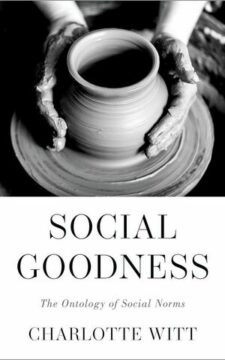Kevin Richardson at Notre Dame Philosophical Reviews:
 It is incredibly difficult to say something new about social norms. The question “What is a social norm?” has been given many detailed answers by philosophers and social scientists. Social norms are often theorized as rules of some kind; most of the ensuing literature concerns the nature of such rules and how they are established or maintained. Despite the mountain of literature on social norms, Charlotte Witt’s Social Goodness not only makes an original contribution to the literature, but it also does so in a way that points toward important, underexplored regions of conceptual space.
It is incredibly difficult to say something new about social norms. The question “What is a social norm?” has been given many detailed answers by philosophers and social scientists. Social norms are often theorized as rules of some kind; most of the ensuing literature concerns the nature of such rules and how they are established or maintained. Despite the mountain of literature on social norms, Charlotte Witt’s Social Goodness not only makes an original contribution to the literature, but it also does so in a way that points toward important, underexplored regions of conceptual space.
The traditional philosophical question about social norms is: what is a social norm? In Social Goodness, Witt asks a different question: what is the source of social normativity? Alternatively put: what makes social norms binding on us? Witt specifically investigates what she calls social role norms. Teachers ought to teach. Students ought to do their homework. Parents ought to take care of their children. In each case, we have a norm that follows from a social role (teacher, student, parent).
more here.
Enjoying the content on 3QD? Help keep us going by donating now.
